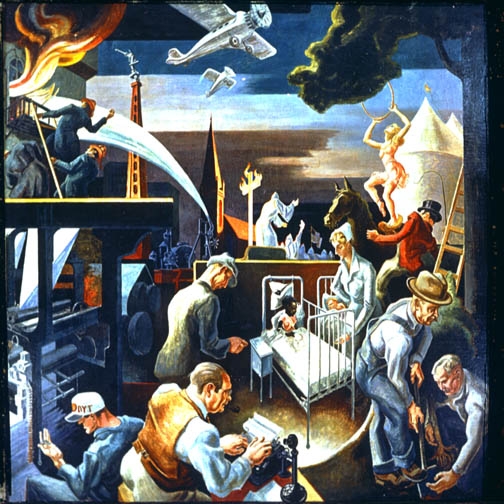|
|
By Scott Tibbs. Published at Enter Stage Right, February 4, 2002
The American higher education system, at its best, should be a place where one's mind is expanded. It should be a place where one is exposed to a diverse range of ideas, thoughts, ideologies and beliefs, so that one can learn about and analyze them and make an informed decision about the merits of each one. Above all else, colleges and universities should educate their students on the world they live in.
But some elements of the radical left do not believe that education, or the free exchange of ideas, should be put above the feelings of people who may be offended by what they are exposed to. At Indiana University in Bloomington, Indiana, the Black Student Union is arguing that the University should remove a "controversial" mural from a large lecture hall on campus. The painting in question depicts several scenes from Indiana's history, including a scene of a cross burning by the Ku Klux Klan.
The mural's critics argue that students should not be subjected to such offensive images while in a class. But the paintings are hardly pushing an image of the KKK into students' faces. Instead, the image of the KKK is a small part of the overall painting, one that I had to actually look for in order to find when I investigated the matter myself. If a student cannot handle a discreet image on the wall of a classroom and his ability to perform academically is adversely impacted by that image, then perhaps that student should reconsider whether or not he belongs in a place of higher education.
Even if the offensive image in the painting were as visible as its critics claim, it would still not be reason enough to remove it from the walls. If people are offended by images of the Klan, then that is a good thing. The Klan promotes hatred on racial, ethnic and religious grounds and is shunned by the vast majority of people. Evil is not supposed to be something one can look at without negative feelings. Evil is supposed to be offensive. Putting the artwork in a museum, as some have suggested, would completely counteract that purpose. Confronting students with evil forces them to face it, and perhaps consider what can be done to combat that evil. Hiding the art in a museum will not accomplish that, as thousands of students will not face the reality of a shameful historical fact on a daily basis.
By advocating that the art be removed from the walls to protect the delicate sensibilities of a few students, advocates of censorship are actually enabling racists and hate mongers. When the light of truth is shined on racial hatred, then it can be exposed for the intellectually and morally bankrupt fraud that it is.
Should whether something is offensive be the sole criteria for whether it has a place at a public university? After the United States started bombing Afghanistan in response to the September 11th terrorist attacks, local anti-war activists set us a "peace camp" of several tents in Indiana University's Dunn Meadow. If someone is offended by the anti-war message the protesters are conveying, would the Black Student Union argue that person has the right to demand that the University force the protesters out and take the tents down? Would the BSU support a student who demanded that nude statues on campus be removed or covered up because it offended his sensibilities? Somehow, I doubt it.
The intent of the artist who produced the art was to provide an anti-Klan message and to make sure that a chapter of evil in Indiana's history is not forgotten. The intent of the murals is to remind students about the sad historical fact of Klan activity in Indiana. But that does not matter to the would-be censors. One student actually wrote in the Indiana Daily Student, the student newspaper, "The University's mission is to educate, and perhaps this controversial artwork is educational. But education shouldn't come at the expense of someone's feelings."
If that is the case, then Indiana University should close its doors. Part of education is being exposed to offensive or unpopular ideas, so that one can properly analyze and deal with them. Education is not an exercise of emotion; it is an exercise of intellect and reason. Controversial issues and images will naturally stir emotions, but that should never be a guiding factor in whether or not students are exposed to those things in an educational context.

|

